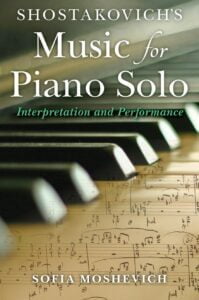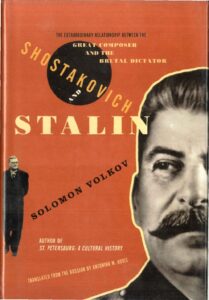Come join us now, and enjoy playing your beloved music and browse through great scores of every level and styles!
Can’t find the songbook you’re looking for? Please, email us at: sheetmusiclibrarypdf@gmail.com We’d like to help you!
Table of Contents
Shostakovich – Prelude Op. 34 No. 1 (sheet music, Noten)

Please, subscribe to our Sheet Music Library.
If you are already a subscriber, please, check our NEW SCORES’ page every month for new sheet music. THANK YOU!
Best Sheet Music download from our Library.
Shostakovich, a life marked by Soviet terror
The fate of the Soviet composer Dmitri Shostakovich (1906-1975) was everything: international recognition and national orders, hunger and persecution by the authorities. His work arouses growing interest almost half a century after his death.
The debate about the relationship of his music with the history of the 20th century has been ongoing for years on an international scale. Yet his creative legacy is unparalleled in terms of genres: symphonies and operas, string quartets and concertos, ballets and film music. Innovative, creatively emotional and humanly humble.
The composer is a classic of the previous century, a great teacher and a brilliant artist who lived through the difficult times in which he had to create and survive. He took the concerns of his people to heart: in his works you can hear the voice of a fighter against evil and a defender against social injustice.
At the age of thirteen, he began his studies at the Petrograd Conservatory, graduating in 1925. His thesis, the First Symphony, immediately became an international success. After graduating, Shostakovich – doubting his vocation – initially made his way as a pianist in movie theaters. While writing the second symphony, he began work on his first opera, The Nose, based on the work of Nikolai Gogol. After sixteen performances, the opera was not performed again in the Soviet Union until 1974. It failed to convince neither critics nor its colleagues.

Shostakovich faces authority and survives. Some say he deserves to be condemned for it. For the writer, however, the question is more complex, and he weighs it carefully. He writes: “I knew that he had to protect those close to him and that to do so he needed calm, but he was desperate. […] Once you had been labeled an enemy of the people, everything around you became incriminating.
Shostakovich achieved great success with his second opera, Lady Macbeth of Mtsensk, in 1934. The play was performed more than a hundred times in two years, until the first blow came. It aroused Stalin’s animosity and in 1936 thunder broke out: after a visit by the dictator to a performance, the opera was condemned in a Pravda article titled ‘Bulls instead of music.’ Opera was accused of “formalism,” “naturalism,” and “cacophony.” The opera was withdrawn from the repertoire.
An ‘ideological reworking’ of the composer’s music began. Scathing articles were written against him and his work, leading to a decline in public interest and his financial situation deteriorating dramatically. Performances of him were cancelled. Shostakovich, accused of “alienation from the people,” lived in constant fear of being a victim of Stalin’s Great Purge.
He feared for himself and his loved ones, after seeing some of his friends and family imprisoned and/or killed. Despite the difficulties in his personal and professional life, the composer did not stop working and wrote his fourth symphony (1935-1936).
However, it is believed that he received a ban, and fearing the regime’s reaction, he removed her from the cartel. It was not released until 1961, after Stalin’s death.
The campaign lasted more than a year and came to an end after the premiere of the successful Fifth Symphony (1937), which was officially recognized as ‘the Soviet composer’s creative response to criticism.’ Julian Barnes writes: ‘The success of the Fifth Symphony was instantaneous and universal.
Consequently, such a sudden phenomenon was analyzed by Party bureaucrats and submissive musicologists, who presented an official description of the work to help the Soviet public understand it. They called the symphony ‘an optimistic tragedy.” Although he was officially rehabilitated and awarded the first of several ‘Stalin Prizes’ in 1941, the fear of death accompanied Shostakovich for the rest of his life.
The greatest world fame came to him during the war years. He composed his seventh symphony, Leningrad (1941), which became a worldwide symbol of resistance to fascism and with which he rose to become one of the most popular composers today. «He had made a big mistake when writing Lady Macbeth of Mtsensk and the Power had punished him accordingly. Regretful, he had composed a Soviet artist’s creative response to fair criticism. Later, during the Great Patriotic War, he had written his seventh symphony, whose anti-fascist message had resonated throughout the world. And in this way he had obtained forgiveness. […] Although the sinner could have been rehabilitated, this did not mean that sin had been eradicated from the face of the earth: far from it,” relates the British novelist, Julian Barnes in his book “The Noise of Time”.
The composer was able to breathe easy for a short time. In 1948 he was struck for the second time by the lightning bolt of Soviet cultural ideology: the accusations of 1936 were repeated. The Juan March Foundation has dedicated three concerts to Soviet censorship. Works by Shostakovich, Roslavets and Weinberg, among others, have been performed at the concerts.
The music critic Juan Manuel Viana writes that “just three years after the end of the war against Hitler’s Germany, the infamous decree drafted by Andréi Zhdanov – Stalin’s right arm in cultural matters – on ‘formalism’ in music, published on February 10, 1948, again condemns his work indiscriminately, along with those of Prokofiev, Shebalin and Khachaturian, among others, due to the ‘anti-democratic tendencies of his music’, characterized by ‘recourse to atonality and the rejection of melody.’
And now they included composers like Sergei Prokofiev. If the latter went into exile in the United States – although he would return for the first time in 1927 – Shostakovich chose the path of internal emigration: on trips abroad, which officials forced him to do as a representative of Soviet music, he gave the impression of loyalty to the regime; but he confided his true feelings cryptically in his compositions, many of which could only be performed after Stalin’s death. Only the publication of Shostakovich’s memoirs by Solomon Volkov, – although its authenticity remains disputed today – revealed many of his intentions.
The ‘pessimism’ of his symphonies, distant from the Soviet people, served as a convenient pretext for attacks against Shostakovich. In an attempt to deflect the blows from himself, the composer gave a speech in which he repented and admitted ‘the mistakes he had made.’ He did it with an absurd and, apparently, deliberately exaggerated expression, which is very reminiscent of the speeches of the heroes of the writer Mikhail Zoschenko.
This time, the consequences are more serious than in 1936. Among them, the composer’s expulsion from the Moscow and Leningrad Conservatories for ‘professional maladjustment’ and detrimental influence on young composers.
The Glavrepertkom (the state control and censorship body) banned the performance of his operas and symphonic works, a veto that was lifted a year later by Stalin’s personal order. The Russian composer lived in constant terror and psychological panic. Until the dictator’s death in 1953, Shostakovich’s compositions were mainly film music, ‘Soviet’ works, chamber works, and compositions for children.
The death of Stalin
With the end of Stalin in 1953, a “thaw” also began for Shostakovich. His operas were performed again and he rose to high positions. Ten years later, already during Khrushchev’s liberalization, it was recognized that his ‘cancellation’ had been a ‘mistake.’ Shostakovich was then able to return to teaching at conservatories. His works, unknown to listeners during the years of Stalin’s dictatorship, began to be heard. The musician was named president of the Union of Composers of the RSFSR (Russian Soviet Federative Socialist Republic), for which, however, he had to join the CPSU, something he never forgave himself for.
Many of his works composed at this time are imbued with an optimism and vitality unknown in his work. A typical example of this is the Moscow operetta, Cheromushki (1959), a musical comedy.
What differentiates Shostakovich’s work, and why is it fundamental in music education?
He had a high technical level, knew how to create vivid melodies, mastered polyphony and orchestration perfectly, experienced strong emotions and reflected them in music. Thanks to all this, he created musical works that have a distinctive and rich character, as well as great artistic value.
His contribution to the music of the last century is invaluable. Shostakovich, whose biography and work were equally intense, displayed great aesthetic and genre diversity. He combined tonal, modal and atonal elements and created true masterpieces that brought him worldwide fame. His work intertwined styles such as modernism, traditionalism and expressionism.
